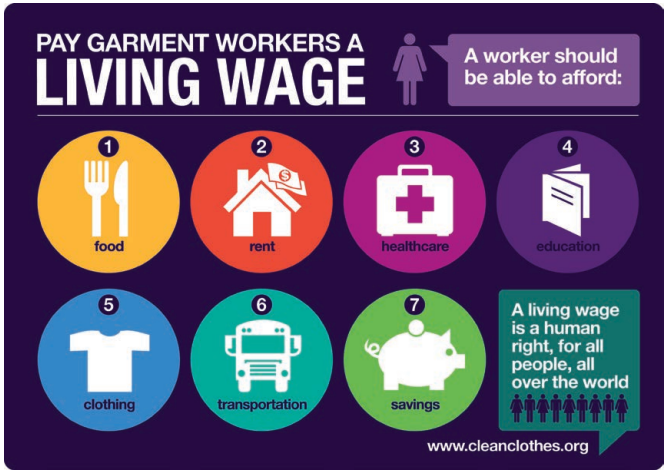The global apparel industry is effectively responsible for the livelihood and wellbeing of millions of individuals across the world, particularly in poor and developing economies such as Bangladesh, Cambodia and Myanmar, but supply chain ethics are often lacking.
The Living Wage
Article 23(3) of The United Nations Universal Declaration of Human Rights states: “Everyone who works has the right to just and favourable remuneration ensuring for himself and his family an existence worthy of human dignity.” Living wages are therefore a human right, and essential in developing countries where governments provide no social benefits to the most vulnerable citizens.
However, a regular study entitled Tailored Wages - a joint venture between the charity Clean Clothes Campaign and government bodies - found that the living wage is still a myth in multiple countries. Many workers in the global apparel industry are unable to afford a dignified existence, often earning under £5 a day in an industry worth more than £28 billion throughout Europe alone. On average, a realistic living wage is triple the minimum wage a garment worker receives in key garment-producing countries.
Women represent about 80% of those employed in the global apparel industry and are often caught in a cycle of insufficient pay and poverty, making it impossible for them to leave their jobs or even consider striking for better pay.
 View larger
View larger What is a Fair Day’s Pay?
The Asia Floor Wage Alliance is an international coalition of trade unions and activists fighting to secure a living wage for garment workers in Asia. The alliance is in talks with manufacturers, retailers and even local government organisations in an attempt to negotiate its payment.
A living wage is more complicated than first imagined. For instance, it should always meet the needs of a family, rather than an individual, as most developing economies lack social security for caregivers or public care services. A living wage should also allow for savings, not just day-to-day living costs, enabling workers a chance to escape from vulnerable situations where they have no choice but to constantly work. In addition, living wages should be implemented regionally in order to avoid increasing wage competition between countries.
Not as simple as abandoning Bangladesh
The ‘Made in England’ label is making a comeback in today’s fashion industry, as consumers link local production to high-quality and ethical supply chains. While this is great news for England’s textile and apparel industries, it would be naïve to expect this trend to overtake that of global sourcing.
Although Britain’s manufacturing power may be on the decline, many developing economies are experiencing their own industrial revolution in the present day. Countries such as China, once known for cheap labour and products, have benefitted so much from their manufacturing power that they have now started to implement higher minimum wages as their economies strengthen.
Bangladesh’s factories represent a major source of international trade, and if fashion retailers simply turned their backs on Bangladeshi products tomorrow it would cause mass unemployment and starvation. So perhaps introducing supply chain ethics would be the best move for all. As a recent Independent editorial noted: “Trade is better than aid, and fair trade is better than unfair trade.”
Ethical Supply Chains
Supply chain management must step up in today’s global apparel industry, as various factories in Bangladesh are forced to make significant renovations or are even shut down as a result of health and safety violations. Recent strikes over pay and working conditions have also interrupted garment manufacturing across Bangladesh, Cambodia and Haiti. Not only can weak supply chain management ruin a brand’s ethical credibility – now it can also lead to halted production lines as suppliers are closed for business!
Ethical sourcing can be incredibly difficult to enforce across complex global supply chains, which is why it is so vital to maintain control over all suppliers and manufacturers. A common downfall for supply chain ethics is third party outsourcing, which can often occur without a retailer’s knowledge. Segura production tracking systems enable retailers to take control of their secondary supply chain of labels, packaging, hangers and other trim items. Our web based platform enforces transparency on each and every link of your supply chain, making ethical sourcing a natural part of your business activities. Contact us today to find out more.
Originally published April 2014.


